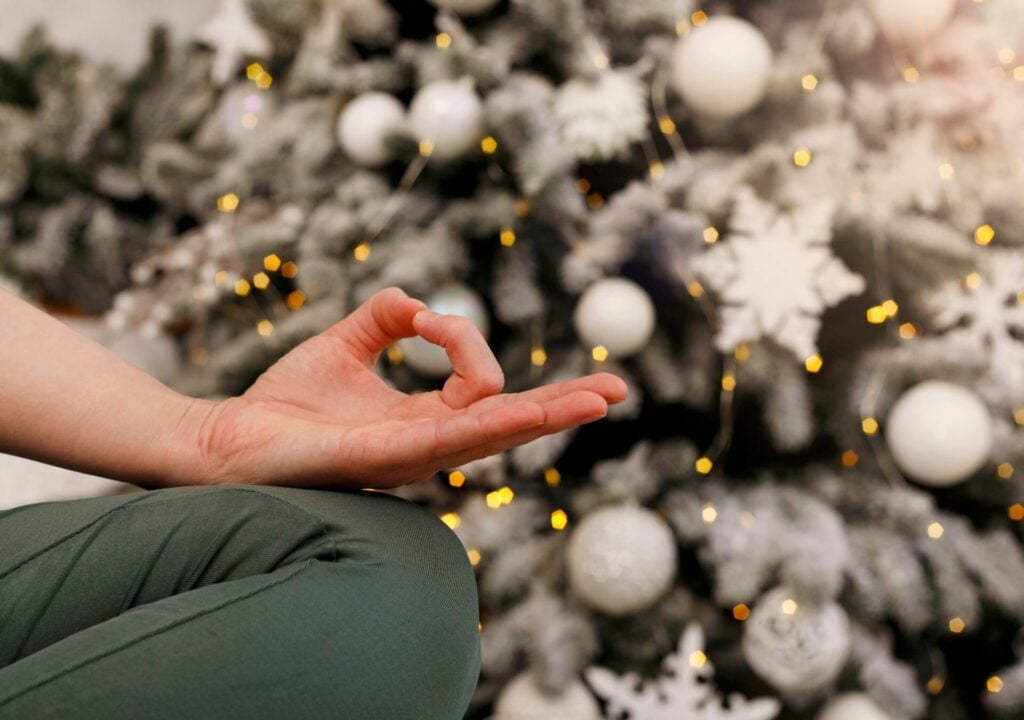Although it’s only a couple of weeks until Christmas Andrew and his wife Mya are dreading the festive season. The couple, both aged 47, have family visiting from the UK and the Netherlands. Their teenagers are already complaining they’ll have to share a room in the family’s three-bedroomed apartment, while the relatives keep Whatsapping to ask what’s on the menu on December 25.
‘It’s such a stressful time of year,’ says Mya, who runs her own marketing company. ‘I worry about the dinner, if my parents are happy, if the kids will get off their iPhones to talk to our guests, if they start squabbling….it all gets to me.
Studies have revealed an incredible 88 per cent of people believe the Christmas holidays are the most stressful time of the year
‘Then Andrew starts saying he hates the holidays, and instead of being the most wonderful time, it becomes the most fractious and miserable period of the year.’
Mya isn’t alone. Studies have revealed an incredible 88 per cent of people believe the Christmas holidays are the most stressful time of the year.

But the festive period is meant to be a time of giving, joy and celebration, so why does it cause so many so much worry and anxiety?
Self-development and family wellbeing expert Lynette Tipper attributes the Christmas stress to our expectations.
‘It can be so easy to get caught up in the excitement and anticipation of creating the perfect day, that we find ourselves feeling lost, emotionally drained, socially fragile and out of pocket,’ says Lynette, a mindfulness educator and NLP (neuro-linguistic programming) practitioner.
Gill Hasson, a UK-based self-development author, agrees. ‘We romanticise our expectations,’ she explains. ‘We think the holiday period is going to be just as it is depicted in films: everyone is going to get on well, dilemmas get resolved and a huge happy family sit around a table having a fabulous dinner. It’s what we all want and it’s not unrealistic to want to be happy and together.’
But Gill, author of Kindness and Positive Thinking (Capstone), believes Christmas stress arises because we’re forced out of our routine, whether that’s spending whole days with our partners and children in our apartment or villa, and having relatives and friends to stay and being expected to visit others, when all you want to do is stay at home and relish the time off work.
‘We start to worry about everything: what if the dinner doesn’t cook, how will we fit so many people in our apartment, what happens if someone gets Covid, or if people are bored, and what if I’m exhausted from looking after everyone?
‘When you get a group of people together, there are always going to be differences,’ Gill says. ‘Some will have higher domestic expectations than others and want incredibly high standards, while others might enjoy buying expensive presents they know you can’t afford.
‘Then others revert to their childhood role in the family – it’s not unusual for the adult son or brother who’s a highly capable financier to sulk if he can’t watch what he wants to on television, just like he did as a teenager, while the daughter who always kept the peace in the family will retreat at the first sign of conflict.
‘Some members of the family will sit around and expect to be waited on hand and foot, while the others will be exhausted from looking after so many people.’
Describing the holiday period as a ‘psychological minefield’, Lynette agrees tempers may flare causing family stress at Christmas. ‘Just because you’re related, it doesn’t guarantee you’ll all get along,’ she states. ‘Women are substantially more likely than men to report high levels of stress during the holidays, and they’re less likely to take time to relax or manage that stress in healthy ways. That’s why it’s important to recognise that self-care isn’t a luxury, it’s a must!’
So how can we ditch the Christmas stress and ensure that our festive holiday period is enjoyable for everyone?
Plan, Plan, Plan!

‘However you’re celebrating the festive period, whether you’re spending it with your close family, or you’re having other relatives to stay, regard it as an event,’ advises Gill. ‘Event planners don’t just sit back and let the whole day work itself out. They plan in meticulous detail.
‘Invite only as many people as you have room for, or suggest they stay in a hotel. You know them all well, so before the big day, assign them all roles. Put someone in charge of the welcome drinks, have someone help prep the veg and if Dad’s good at devising quizzes, that can be his job!’ Everyone will be so busy it will be goodbye difficult Christmas.
Ditch Christmas Stress!
If you don’t fancy cooking a big dinner with all the trimmings for the 25th, go out for lunch instead, says Gill.
‘Book a table at your favourite restaurant and sit back and relax. There’s no shopping needed, no pressure about cooking and no clearing up afterwards,’ she points out. ‘Or if you’re keen to stay at home, and your guests are local, suggest they all bring a dish to yours. Don’t apologise for this or feel guilty. Recognise your limits and own the decision. It’s your holiday too.’
Get Some Fresh Air

Traditionally, December 25th is a day when we consume as many as 10,000 calories – often four times the recommended daily number. Factor being cooped up together, and you’re guaranteed Christmas stress and some stroppy moments!
‘People often stay in all day and eat, eat, eat,’ says Gill. ‘It’s important to get out, especially if you have small children to avoid any Christmas stress. Go out for a walk and get some air. Go to a park or a play area, go for a family bike ride a run, or to the beach. It’s important to use up that energy in a good way!’
Be Honest
We’ve all been there. You’re cooking dinner, and people wander into the kitchen and try to meddle.
‘They might pop into the kitchen and point out it’s 4pm, and you said dinner would be served at 2pm,’ says Gill. ‘Or they might see you making the gravy and start criticising, saying they don’t make it that way.
‘Be very gracious and say you would really appreciate being left alone to concentrate, or if you want them to help, suggest they take over and make the gravy. And at the end of the holidays, when they’re due to leave, ask them to strip their beds and put the bedding and their used towels in the laundry.’
Practise Moderation

Lynette suggests we adopt an ‘everything in moderation’ approach to the holiday season to ward off Christmas stress and be more relaxed.
‘Start by avoiding over-committing,’ she advises. ‘Don’t cram your diary with event after event, or invite every last cousin to stay. If you spend only what you can afford, it will make January much less painful financially. Don’t go over the top. Keep things simple.’
Make time for yourself: to declutter your mind, practise meditation, read a book or just watch TV, so that Christmas is not overwhelming and you ward off stress.
Curb the Clutter
The festive season is a time when we completely overindulge, but we don’t need to shop until we drop and create even more items for landfill. Your holiday season can be eco-friendly.
‘Create a ‘clutter free gift list’ and let family and friends know that you do have some ideas for what you’d really like that won’t mean more things to store in your home,’ suggest Gill. ‘Request quality over quantity, needs over wants, experiences over products.
‘Ideas for clutter-free gifts include tickets for a cinema, theatre, show, festival, music or sports event; vouchers for a restaurant, afternoon tea or a spa treatment, or to learn a new skill such as flying, yachting and dance; a family photo session; plants and flowers, cuttings and seedlings, or even a car valet.’
Reuse and Recycle
Instead of buying festive things all wrapped in plastic, why not look for gifts in recyclable packaging?
Gill advises: ‘‘Buy recyclable wrapping paper and send recyclable cards if you still send them. Better still, send a donation to a charity.
‘For your dinner table buy beautiful vintage linen from charity shops or pristine linen tablecloths online and re use them every year. There’s no need to use disposable ones.’













